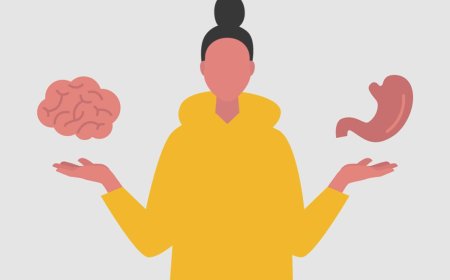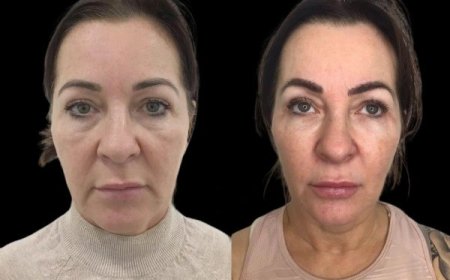Why Early Intervention Matters: Connecting with an OCD Therapist in San Antonio
This article explores why seeking help early is critical, what signs to look out for, and how professional therapy can guide your recovery.

Obsessive-Compulsive Disorder (OCD) is a serious but treatable condition that can disrupt nearly every area of life. When unwanted thoughts spiral into persistent anxiety and ritualistic behaviors, they can quickly take over your daily routines. Fortunately, early intervention with a skilled OCD therapist San Antonio can significantly reduce symptoms and improve your overall mental well-being.
The Nature of OCD and Its Impact
OCD is defined by two key features:
-
Obsessions: Intrusive, unwanted thoughts, images, or urges that cause distress
-
Compulsions: Repetitive behaviors or mental actions done to reduce the anxiety triggered by obsessions
OCD can affect your job, social life, and emotional health. Common symptoms include:
-
Excessive checking of locks or appliances
-
Repeated cleaning or handwashing
-
Mentally reviewing conversations to prevent harm
-
Seeking reassurance or repeating prayers
-
Avoiding specific people, places, or objects
Left unaddressed, these cycles can grow more intense over time. Thats why meeting with an OCD therapist San Antonio as soon as symptoms appear is so important.
Why Early Treatment is Crucial
The sooner treatment begins, the easier it is to disrupt the OCD cycle. Delaying care often allows obsessions and compulsions to become more ingrained. Early therapy offers the following advantages:
-
Shorter treatment duration
-
Reduced symptom severity
-
Improved long-term outcomes
-
Lower likelihood of developing co-occurring disorders like depression or substance use
-
Greater confidence in managing future stressors
An experienced OCD therapist San Antonio can help you identify the disorder in its early stages and create an effective intervention plan.
How a Therapist Diagnoses OCD
To diagnose OCD, a therapist will conduct a comprehensive evaluation that includes:
-
A structured clinical interview
-
Mental health history review
-
Observation of compulsive behaviors or avoidance patterns
-
Screening for coexisting conditions (e.g., anxiety, depression, ADHD)
A clear diagnosis ensures that therapy is targeted and effective. It also helps differentiate OCD from other conditions with similar symptoms.
The Role of ERP in Early OCD Treatment
Exposure and Response Prevention (ERP) is the most effective evidence-based therapy for OCD. In ERP, you are gradually exposed to the triggers of your obsessions and learn to resist the urge to perform compulsions.
For example:
-
Touching a doorknob without washing hands
-
Thinking a feared thought without neutralizing it
-
Leaving home without checking the stove multiple times
The goal is to reduce the anxiety response and retrain your brain to recognize that obsessions are not dangerous. A trained OCD therapist San Antonio introduces ERP in a way that is manageable and personalized.
Benefits of Working with a Local OCD Therapist
Seeing a local therapist offers several practical benefits, especially when starting treatment early:
-
Easier scheduling and access to in-person sessions
-
Familiarity with local support groups and resources
-
Quicker coordination with primary care or psychiatric providers
-
Potential to involve family members in treatment, if appropriate
Early sessions with a trusted OCD therapist San Antonio set the tone for consistent progress and collaboration.
How OCD Therapy Helps Reduce Avoidance
Avoidance is a major contributor to OCDs persistence. People with OCD often:
-
Avoid crowded places to prevent contamination
-
Steer clear of knives due to intrusive harm-related thoughts
-
Avoid religious spaces out of fear of disrespecting sacred symbols
Avoidance may offer temporary relief but ultimately reinforces the cycle of anxiety. ERP therapy teaches you to face these fears gradually, allowing your nervous system to recalibrate.
Addressing Shame and Stigma Early On
Many individuals delay seeking therapy because of shame. Obsessions can feel embarrassing or taboo, especially when they involve themes like harm, religion, or sexuality. A compassionate OCD therapist San Antonio helps normalize these experiences and offers a judgment-free space to talk about difficult thoughts.
Early intervention helps prevent that shame from growing into secrecy or isolation, allowing for healing to begin sooner.
OCD Therapy for Children and Teens
Children and adolescents can develop OCD too, and early treatment is essential for healthy emotional development. Pediatric OCD may present as:
-
Repetitive questioning or reassurance-seeking
-
Obsessive need for symmetry or perfection
-
School refusal or academic disruptions due to rituals
Therapists experienced in pediatric OCD use age-appropriate ERP techniques and collaborate with parents and teachers to build a supportive care environment.
When to Seek Help from a San Antonio OCD Therapist
Even mild symptoms can escalate if left untreated. Its time to seek help when:
-
You spend more than an hour a day on obsessions or compulsions
-
You feel distressed by your thoughts or rituals
-
You notice disruptions in work, school, or relationships
-
You avoid activities or people to reduce anxiety
-
Youve tried self-help methods without success
Prompt support from an OCD therapist San Antonio can make the difference between worsening symptoms and early recovery.
Common Misconceptions That Delay Care
Several myths prevent people from getting help early:
"Its just a quirk or personality trait."
OCD is a recognized medical condition that requires treatment.
"I should be able to control it on my own."
OCD is not a willpower issue. Professional support is often needed.
"If I ignore it, it will go away."
Without treatment, OCD usually persists or worsens over time.
Taking the First Step
If you recognize signs of OCD in yourself or a loved one, dont wait. Reaching out to a qualified OCD therapist San Antonio as early as possible can lead to faster recovery and a better quality of life. Therapy not only teaches you how to interrupt the OCD cycle but also empowers you to regain control over your thoughts, behaviors, and future.







































